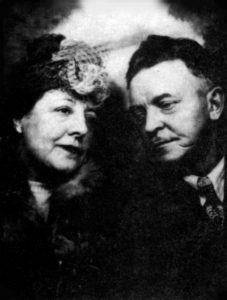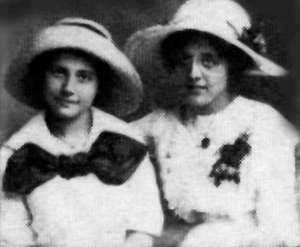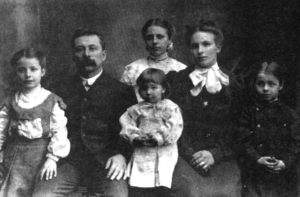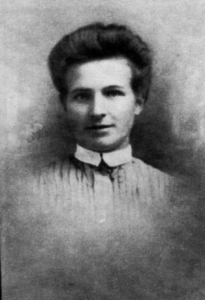
SRHS
Steamboat Rock Historical Society
THE 1880’S IMMIGRATION AND OUTLAWS
IMMIGRATION STORIES (Part II)
“ When we were all kids at homes everyone sang. Chub had a Kate Smith-type of voice only more powerful and with greater range. However, she became a chronic asthma patient so she did not sing much in later years. If one can’t breathe, certainly one can’t sing. She didn’t play the piano by note, but she could cord like mad and that served the same purpose for family song fests”.

Gertrude (Chub) & Clarence (Nip) Nipper
Gertrude (Chub) married Clarence Nipper (Nip) who had two boys by a previous marriage. Nip worked for Bill Hartman and took over and ran the well drilling business after Bill died.
“Four or five years before her death, she decided she wanted to take piano lessons. They acquired a second hand piano, or maybe it was an old fashioned pumporgan. I’ve forgotten. Anyway, she did take lessons and was able to play simple music and hymns within a short time.”
“Agnes (second daughter) and Roy Beamsley were divorced. They had two children, Eloise, and Bonnie. Roy later married one Ruby Christensen and lived in McAllen until his death. Agnes eventually married Roy Glaze of Ackley Iowa and lived in Ackley. Agnes suffered a long illness and after some time she and Roy Glaze were also divorced. No children.”

Chub & Agnes Hartman. They wrote the song “The Titanic Disaster” and went on a tour of Iowa singing and selling the sheet music.
“When the Titanic struck an iceberg in 1912, and sank, Chub and Agnes wrote a sheet of music entitled “The Titanic Disaster”. Bill thought it was so great that he took the two girls on a tour of Iowa to publicize their masterpiece.”
“They played their musical instruments, sang songs including “The Titanic Disaster” and then sold their sheet music to the audience. In a certain hotel in which they were staying during a one-night stand, Bill was repeatedly awakened during the night by knocks on the door and feminine voices whispering for him to “open up”. He soon realized that he and the girls were staying in a house of ill repute. The tour and the girls show business carriers were ended abruptly.”
“Agnes was a beautiful woman and a natural musician. She had a grand voices played the piano and studied the violin. She attended college at Cedar Falls and then taught music throughout Hardin County.”
If it is not already clear the Hartmans were a fun loving family. In a later writing Birdie gave some accounts of jokes that family members played on one another. They are inserted here.
“The following story proves that Dad and Mother were two of the greatest practical-jokers of all time.”
“Dad bought some pullets. They became his pets and he could call them by name and they would come to him. He loved those birds and had high hopes for them.”
“One day he found one egg. He was so proud he told everyone he saw. Then there were two eggs and each time there was an increase in yield he would spread the news. Then he got more ‘ eggs than he had pullets. Those pullets proved to be exceptional layers and Dad started gathering the eggs both at noon and In the evening. All the friends listened in amazement and started rooting for the pullets.”

William Harman family
“One day Dad had to go home unexpectedly in the middle of the afternoon and found Ma in his chicken house putting into the nests all the eggs he had taken out at noon.”
“Dad stopped talking about the great egg supply, but his friends never stopped reminding him of those fantastic pullets.”
“Then there is the one about the pipe tobacco. Dad smoked a pipe at the shop and bought his tobacco in a large, round can. When farmers came into the shop to get work done, if they smoked a pipe they dipped into Dad’s convenient tobacco can, One day Dad told Willard and Kenney he was going to playa joke on those moochers.”
“He slipped down to the grocery store and came back with a new can of tobacco for his own use. This he hid under a loose plank in the floor.”
“The old can had plenty of tobacco left in it. Dad swept up a little dried horse manure and mixed it into the tobacco remaining In the old can. Then he put this can back-in its usual place where the farmers would see it.”
“Willard and Kenney observed all this. That night they went back to the shop and switched cans.”
“Now just imagine what happened when Dad took his firstin-the-morning puff on his pipe!”
“I think the boys must have had to be crazy to play this trick on Dad as he had a terrific temper. I’ll bet, however, that he was secretly amused to find that these kids could put one over on their old man.”

Ernestina (Gast) Hartman
“Ma was a good fisherman; she loved to catch fish and she loved to eat fish. She had a great reputation around town for never going home empty handed.”
“One day she went down to Tower Rock and fished all day without any success. She hated to go home and admit to Dad that she had not caught even one small fish.”
“Then Saul Barnhisel, a mentally deficient “river” man came along and showed Ma the great big fish he had just caught. Ma decided to buy the fish and tell the family she had caught It. She had no money with her but she made a deal with Saul to pay him the next day.”
“She took the fish home and there was great excitement over this mammoth fish she had just caught. The neighbors came over to see it and everyone congratulated her on always finding the best fishing holes. All evening Ma and her fish received a lot of attention and praise.’
“The next morning, early, Dad glanced out the window and saw old Saul walking up and down the street, up and down the street. After about thirty minutes of this Dad could stand it no longer and went out to find out what Saul was doing, pacing back and forth in front of the house.”
“Saul said, ‘Wall, Bill, I’m jest waitin’ fer Tena ta pay me fer the fish she caught yestiddy.”
The first son of William and Tena Hartman was Orlo, “Orlo Kruger Hartman left Steamboat Rock High School in his senior year, lied about his age and enlisted in the army during World War I. He served In the expeditionary forces in France In the 4th Co., H. Reg A.S.M. I don’t know the year he was discharged but he was the last of the local “boys” to return home.”
Orlo married Susie Pearl Thomas in 1922. They had seven children, Norma (adopted), Orlis, Sue, Ernestine (died in infancy) John, and Norma (Norma, died at the age of 4).
Orlo ran the O.K. Hartman General Auto and Tractor Service in Steamboat Rock from the time of his army discharge to the mid 40’s.
“During World War II he worked at the Waterloo John Deere Company and was considered a hydraulics expert. He left to go to Minneapolis where he worked for the Northern Pump Co. That Company had many government war contracts and paid the highest wages in the midwest.”
“The family moved to Arizona and settled In Phoenix. Orlo loved the desert. He lived in a mobile home at Reams Canyon, which is a Hopi Indian Reservation about 320 miles northeast of Phoenix. He went home to his family on weekends when he could. He worked for the Government as superintendent of a Government owned power plant which furnished electric power for two mesas and a coal mine. This power provided heat and water for 50 homes, a large day school and a hospital. Orlo had a crew of 16 men working for him.”
“One day a tank of chlorine which Orlo was holding, slipped and struck the concrete causing a relief valve to open. The full blast of chlorine spray struck Orlo In the face. The Inhalation burned his throat and bronchial tubes, which blistered and sealed off the air to his lungs causing moisture to form in the lungs.”
“Orlo continued to work for 21 days after the accident, was then hospitalized in the Veterans Hospital in Phoenix where he died an March 24, 1957, just seven months after the accident. Orlo’s body was brought back to Steamboat Rock for burial. His son, John, then 15 years of age accompanied the body.”
Now as Steamboat Rock Celebrates it’s 150th birthday, Orlo Hartman’s son John Hartman, is the mayor of Steamboat Rock.
“Orlo, like our mother, was full of practical jokes. While in the hospital he still found ways to play tricks. A nurse might find a spider in her pocket; the maid might move a waste basket and find a coiled snake … all rubber, of course, This helped to break the monotony and probably made dying just a little easier.”
The next child in line is the author Birdie Hartman Standish. She was born in Steamboat Rock, July 18, 1903. In September of 1926 She married John Fair Howard. They had no children.
Her story goes, “I was graduated from UNI when it was State Teachers College; taught a total of four years in Iowa; spent a couple of years in the office of the Adjutant General In Washington, D. C. working on the bonus for World War I veterans. At that time married women were never hired as teachers, so after I married John I attended the old Corn Belt Business College and eventually went into the law offices of Reed and Beers and, after many years became legal assistant to Cylenn B. Beers. I stayed with the firm for thirty years. John was ill so I resigned and stayed home with him. After his death I went into the legal department of the Black Hawk County Juvenile Probation Department where I remained for 7 or 8 years, married Ralph (Ralph Standish, September 1967) and retired.”
“Since my retirement I have written many poems and a few short pieces of prose all of which has been published. I am very proud of the fact that I have been elected to membership in the National League of American Pen Women. Also, I have been painting and my oils have hung,, in the Waterloo Art Assn., Blacks Skyroom Gallery, the Waterloo women Club and elsewhere.”
“Ralph and his first wife, John and I had been almost next-door neighbors for many years. When both Ralph and I lost our partners it seemed quite natural that we should join forces. It was a great idea! We were able to spend winters in Arizona or California, went to the Hawaiian Islands twice and had reservations for a Caribbean cruise when he became ill.”
“A very colorful character in the fabric of Steamboat Rock, was Willard Hartman, the second son of Bill Hartman. He not only kept the Hartman name alive in Steamboat Rock for another generation but you might say he kept it lively.”
“Willard was born in Steamboat Rock in 1908. He married a Steamboat Rock school teacher, Olga Krmenak in 1937. They had one son William (Bill).”
“Willard was graduated from Steamboat Rock High. While playing baseball he was struck In the nose by a ball. This injury caused a breathing disability. After working a summer for Northwestern Bell he came to Waterloo, and stayed with John and me, and commuted to State Teachers College at Cedar Falls. While in Waterloo he had surgery on his nose but this was not successful He was instructed by his doctor to drop certain medication into his nostrils daily. Eventually, this medication caused Willard’s skin to take on a grey lavender color. He was a curiosity and every doctor that saw him wanted to examine him. He was the subject at several clinics. He had a beautiful tenor voice but could not sing much because of this breathing disability.”
“Dad died in 1930 and soon thereafter we were in the depths of the depression. The farm which our parents had purchased as an investment was rented but the tenant could not pay the rent, so mother took the two boys and moved onto the farm. The banks were closed and there was no financial help to be had. I was working in Waterloo, Vivian had graduated from nurses training and was working for Dr. Nyquist in the hospital at Eldora, Both of us sent money to the farm; it wasn’t much but apparently it was enough. Willard liked farming and stayed on. In 1937 he was able to buy the farm from Mother and lived there until his death. He worked hard, too hard. He died of heart failure (1972).”
© 2020 Steamboat Rock Historical Society | All Rights Reserved
Powered by Hawth Productions, LLC